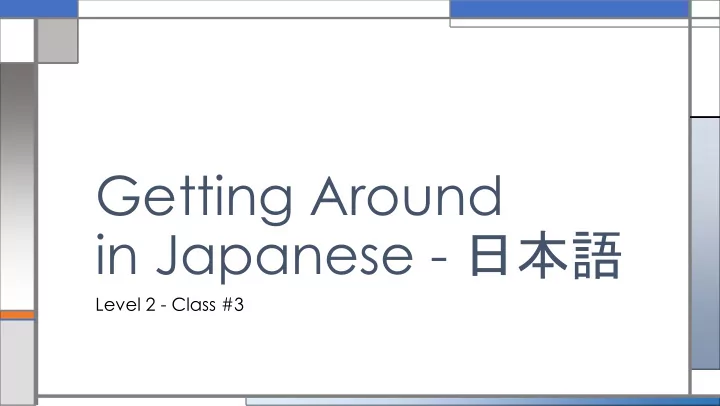

Getting Around in Japanese - 日本語 Level 2 - Class #3
Level 3 Student, teacher, senpai Phrases Okurigana Japanese names TBD Intro to Kanji “Ta” / “ Te ” verbs Months and years Kanji Advantages / based on your Disadvantages Adjective opposites Countries Katakana – Part II interests TBD Past tense People and Family Level 2 More places More about you Want, Like, Need Polite vs. Casual Katakana – Part I Ordering things Masu / nai verbs Time and Days Homonyms This is, that is not Particles de/no/to Car, Train, Road Hiragana – Part II What do you like Emphasis / Tone Noun negatives Numbers, Colors Level 1 Beware of Meaning School, Bank, Money Mini introduction Particles wa/wo/no Dakuten ( ゛ ) Handakuten ( ゜ ) Particles / Order Jyanken (game) Verbs I, II, III Food and Drink Why Hiragana What is this, where is it Adjective na/i Mandatory This, That, What, Where Hiragana – Part I This is mine, that is yours “ Gojyuon ” 4 Writing Systems Noun da/desu Me, You, Us Level 0 日本語 About Written Grammar Vocab Japanese Japanese
Today I will focus on: Level 2 More places More about you Want, Like, Need Polite vs. Casual Katakana – Part I Ordering things Masu / nai verbs Time and Days Homonyms This is, that is not Particles de/no/to Car, Train, Road Hiragana – Part II What do you like Emphasis / Tone Noun negatives Numbers, Colors 日本語 About Written Grammar Vocab Japanese Japanese
Conjunction Particles – to – A conjunction like “and” (Mika and I went there) • と * と – has a nuance that implies only the nouns listed • If you say you went to the bank と (and) the library, those are the only two places you went • とか – toka – An open ended conjunction (I like beef, port, chicken…) – I will cover more in future lessons • ?
Conjunction Particles わたしとまりはいく。 N 1 と N 2 ( が・は ) 。 Watashi to mari wa iku. N 1 とか N 2 とか ( が・は ) 。 やさいとかくだものとかがすきだ。 Yasai toka kudomono toka ga suki da.
Question Words People – Who? Objects – What? Locations – Where? だれ? なに? どこ? Question word? dare? nani? doko?
Exercise • Who do you eat with? • What do you like to eat? • What do you like to drink?
Particles (Joshi) and Verbs – wo/o – Object of an action (I eat fish ) • を – de – A means of travel (I will go by bicycle/car/train) • で – ni – Target of a motion verb (I will go to the station) • に – ni – Something you “get on” (I will get on the train) • に
Food! 食べ物 - たべもの - tabemono 肉 – にく – Niku 魚 – さかな – Sakana Fish Meat 魚 肉 果物 – くだもの – Kudamono 野菜 – やさい – Yasai Fruit Vegetables 野菜 果物
Eat! Meat Eat 肉 食べる を にく たべる wo niku taberu
Drinks! 飲み物 - のみもの - nomimono 水 – – Mizu お茶 – おちゃ – Ocha みず Tea Water お茶 水 酒 – さけ – Sake koohii コーヒー Sake Coffee コーヒー 酒
Drink! Drink Beer 飲む を ビール のむ wo biiru nomu
Places! 場所 - ばしょ - basho ginkou toshokan 銀行 ぎんこう 図書館 としょかん Library Bank 図書館 銀行 eki shigoto 駅 えき 仕事 しごと Work Station 仕事 駅
na-Adjective ie shoutengai 家 いえ 商店街 しょうてんがい Home Shopping Street 家 商店街
Go to! Go Station 行く に 駅 いく ni eki iku
Transit 乗り物 - のりもの - norimono kuruma jitensha 車 くるま 自転車 じてんしゃ Bicycle Car 自転車 車 densha michi 電車 でんしゃ 道 みち Road Train 道 電車
Go “by” ____! Go Train 行く 電車 で いく でんしゃ de densha iku
Get “on”! Get on Train 乗る 電車 に のる でんしゃ ni densha noru
Particles (Joshi) and Questions – wo/o – Object of an action (I will eat fish ) • を – de – A means of travel (I will go by bicycle/car/train) • で – ni – Target of a motion verb (I will go to the station) • に – ni – Something you “get on” (I will get on the train) • に
Exercise • What do you eat? Nani wo taberu no? • What do you drink? Nani wo nomu no? • Where do you go? Doko ni iku no? • How do you go there? Dou yatte iku no? • What are you getting on? Nani ni noru no? • Who will you go with? Dare to iku no?
Verb Groups in Japanese - There are 3 groups of verbs Japanese - Unfortunately each group has many names - Differentiated by the stem or root Group 1 Group 2 Group 3 “ u ” verbs “ ru ” verbs Irregular verbs go-dan verbs ichi-dan verbs する - suru - to do くる - kuru - to come nom u tabe ru No stem
Group 1 Verbs Group 1 “ u ” verbs go-dan verbs Group 1 verbs: - always end in the "u" column of the hiragana chart in their dictionary "plain" form - conjugate by changing the final hiragana character to another hiragana in the same row only - Go-dan means that there are 5 possible endings (go means "five") - are the only verbs in that end in anything besides る in their dictionary "plain" form
Phrase of the Day Wakaru ・ Naruhodo わかる ・ なるほど Common Translation: “ I understand !” ・ “I see!” or “now I get it!” My thoughts: A casual way to say you understand, or understood an explanation Usage: Use it when you’re told where something is, how something works, etc..
Questions? Visit my online resources www.writericesensei.com www.facebook.com/WhiteRiceSensei/ www.youtube.com/channel/UCSrQHvLKMsn6eo7dlGdTmtA
Recommend
More recommend